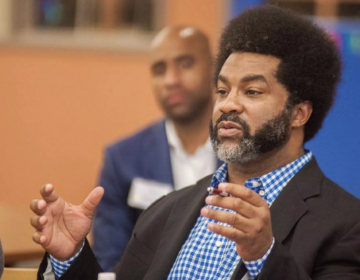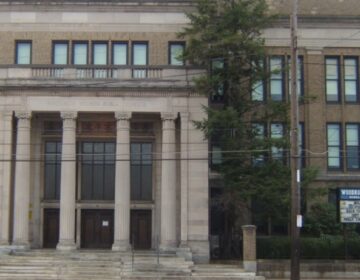An evening of frank talk about race, inequity in Philly, area schools
-
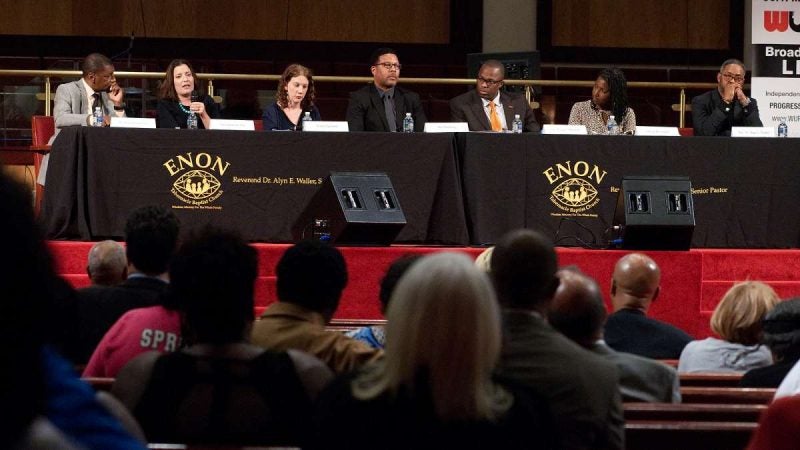
Courageous Conversations: Reimagining Race and Education forum at Enon Tabernacle Church, on Thursday night. (Bastiaan Slabbers for WHYY)
-
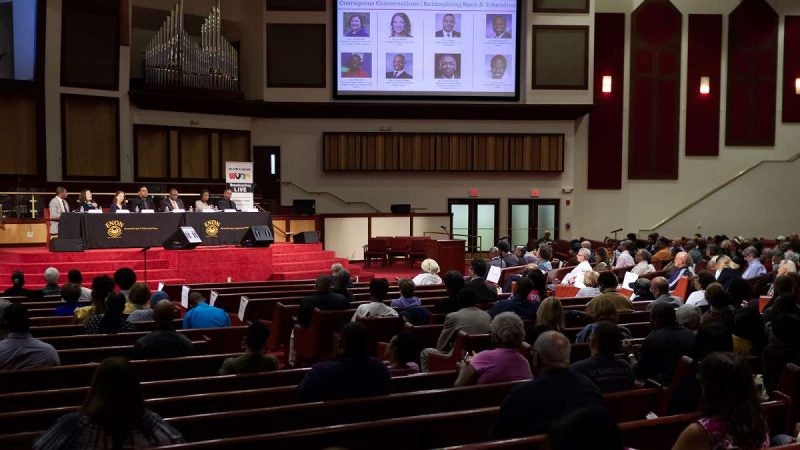
Courageous Conversations: Reimagining Race and Education forum at Enon Tabernacle Church, on Thursday night. (Bastiaan Slabbers for WHYY)
-
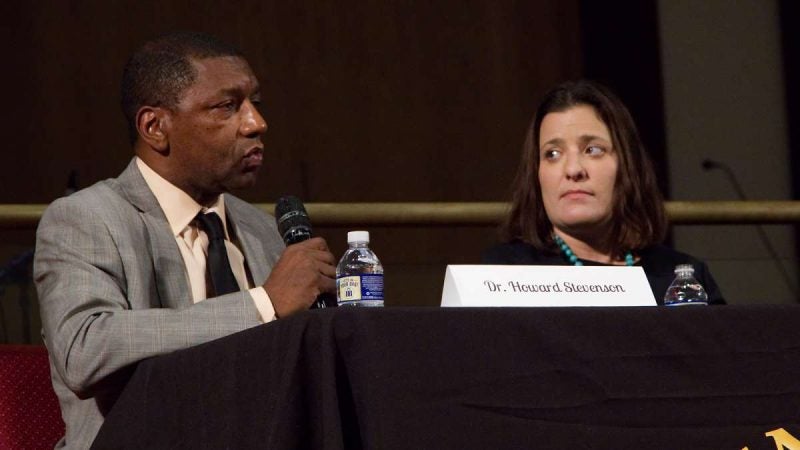
Moderator Dr. Howard Stevenson and Sara Goldrick-Rab Professor of Higher Education Policy & Sociology at Temple University during Courageous Conversations: Reimagining Race and Education forum at Enon Tabernacle Church, on Thursday night. (Bastiaan Slabbers for WHYY)
-
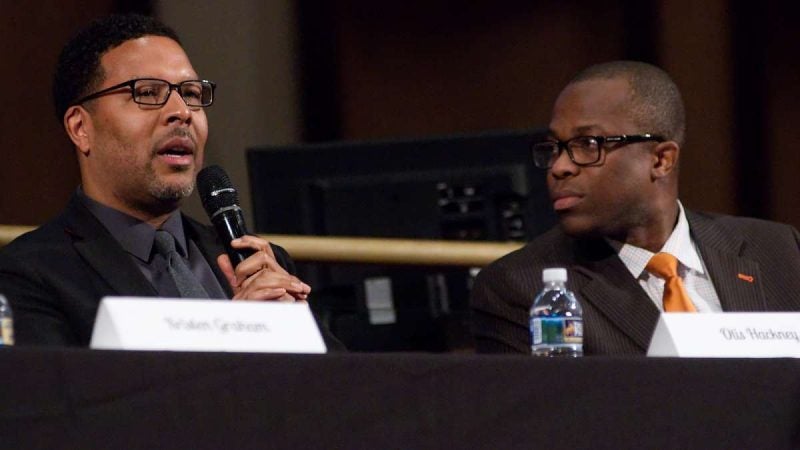
Otis Hackney, Chief Education Officer, City of Philadelphia; and Dr. Wagner Marseille, Superintendent of the Cheltenham School District during Courageous Conversations: Reimagining Race and Education forum at Enon Tabernacle Church, on Thursday night. (Bastiaan Slabbers for WHYY)
-
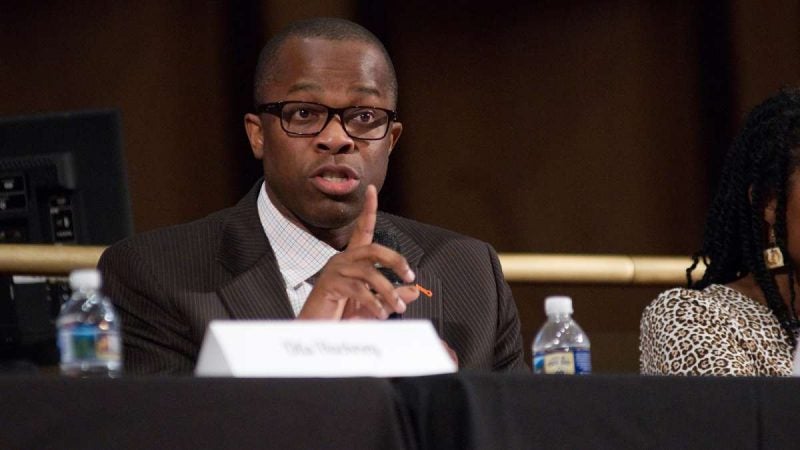
Dr. Wagner Marseille, Superintendent of the Cheltenham School District reacts to a question during Courageous Conversations: Reimagining Race and Education forum at Enon Tabernacle Church, on Thursday night. (Bastiaan Slabbers for WHYY)
-
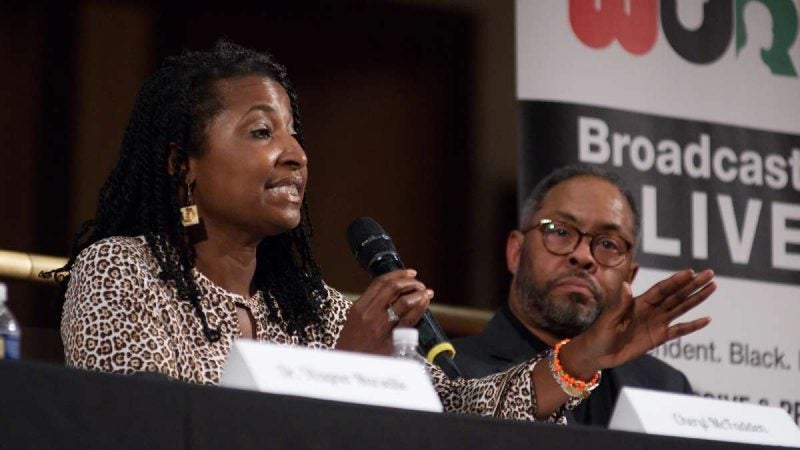
Cheryl McFadden, teacher at Randolph Tech. High School during Courageous Conversations: Reimagining Race and Education forum at Enon Tabernacle Church, on Thursday night. (Bastiaan Slabbers for WHYY)
-
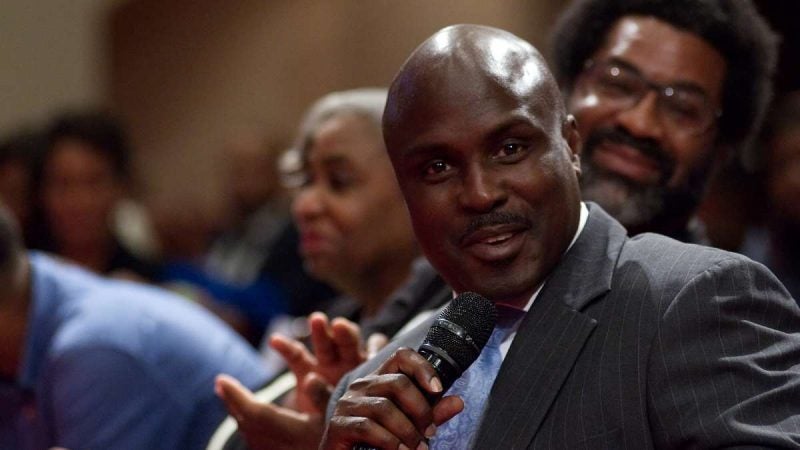
Solomon Jones, co-moderator, seated with a sub-panel, during Courageous Conversations: Reimagining Race and Education forum at Enon Tabernacle Church. (Bastiaan Slabbers for WHYY)
-
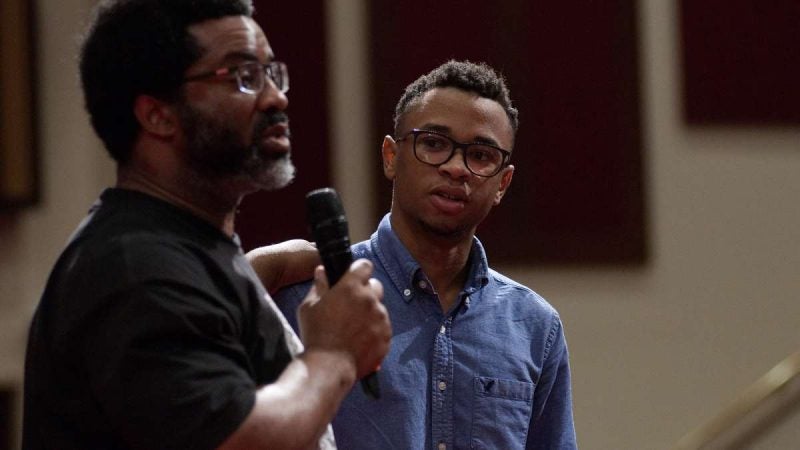
Sharif El-Mekki, principal at Mastery Charter School-Shoemaker during Courageous Conversations: Reimagining Race and Education forum at Enon Tabernacle Church, on Thursday night. (Bastiaan Slabbers for WHYY)
-
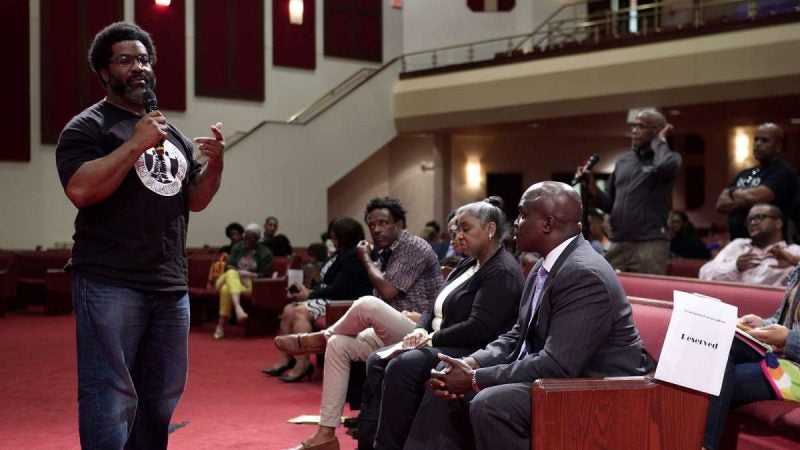
Sharif El-Mekki speaks at a forum on race and education in Philadelphia in 2017. (Bastiaan Slabbers for WHYY)
-
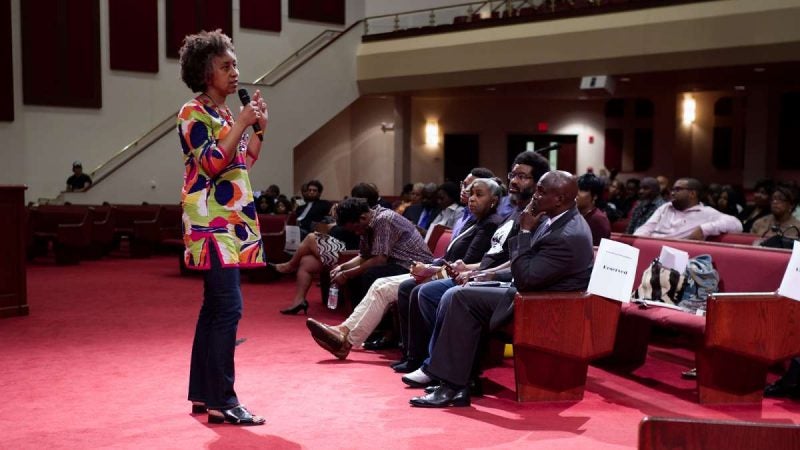
Hilary Beard, member of the sub panel, speaks during Courageous Conversations: Reimagining Race and Education forum at Enon n Tabernacle Church, on Thursday. (Bastiaan Slabbers for WHYY)
-
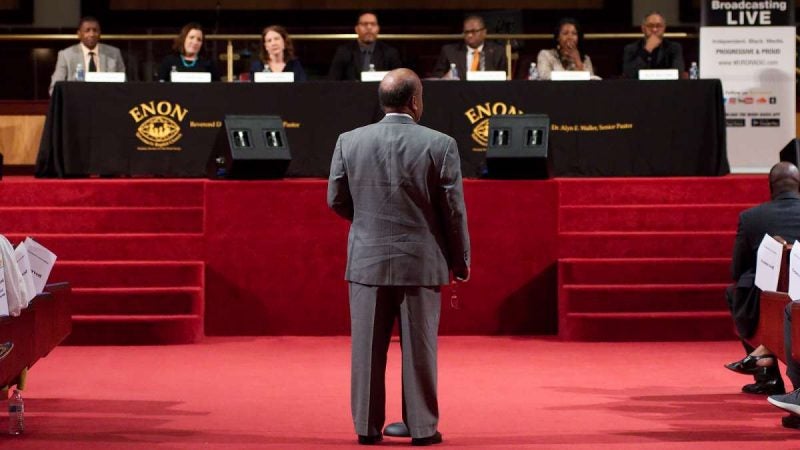
Retired educator Craig Brown asks a question of the panel during the Courageous Conversations: Reimagining Race and Education forum at Enon Tabernacle Church, on Thursday. (Bastiaan Slabbers for WHYY)
-
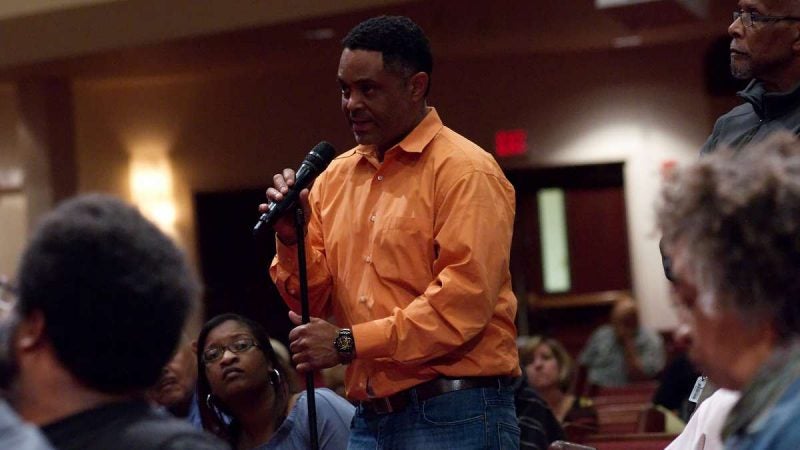
The audience interacts with the panel during Courageous Conversations: Reimagining Race and Education forum at Enon Tabernacle Church, on Thursday. (Bastiaan Slabbers for WHYY)
-
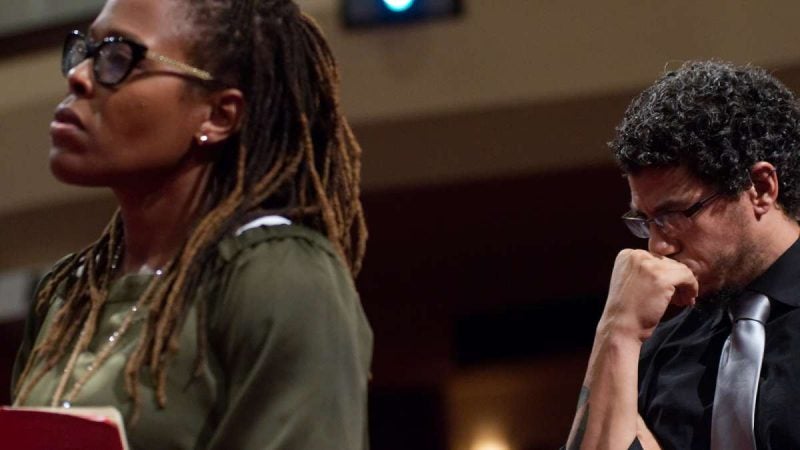
Members of the audience listen as the panel on stage replies to raised questions during the Courageous Conversations: Reimagining Race and Education forum at Enon Tabernacle Church, on Thursday. (Bastiaan Slabbers for WHYY)
-
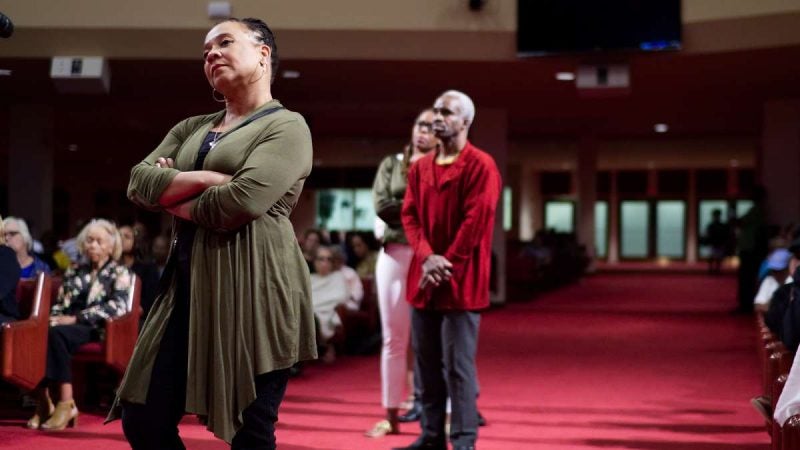
Members of the audience listen as the panel on stage replies to raised questions during the Courageous Conversations: Reimagining Race and Education forum at Enon Tabernacle Church, on Thursday. (Bastiaan Slabbers for WHYY)
-

A view of the audience during Courageous Conversations: Reimagining Race and Education forum at Enon Tabernacle Church, on Thursday. (Bastiaan Slabbers for WHYY)
-
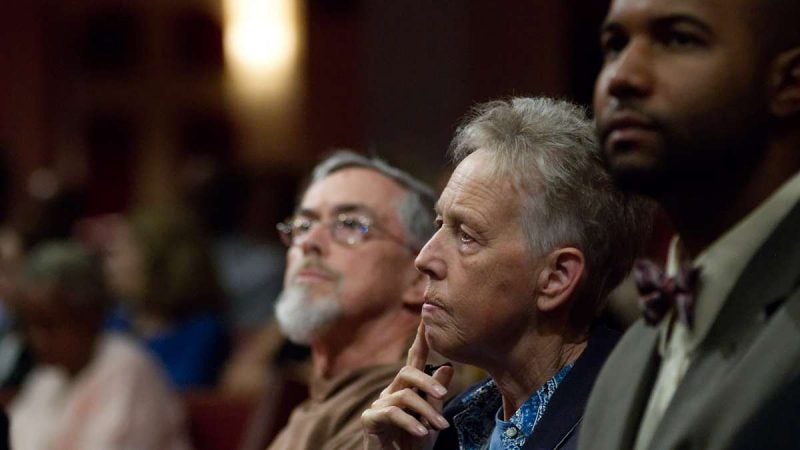
A view of the audience during Courageous Conversations: Reimagining Race and Education forum at Enon Tabernacle Church, on Thursday. (Bastiaan Slabbers for WHYY)
-

Rev. Dr. Alyn Waller, Pastor at Enon Tabernacle Baptist Church mingles after the forum concludes. (Bastiaan Slabbers for WHYY)
When Otis Hackney, Philadelphia’s Chief Education Officer, was in Amsterdam this spring he happened upon an exhibit detailing the history of apartheid. And in that exhibit he saw a quote from one of its architects. It read:
“The Blacks should never see the greener pastures of education,” Hackney recalled at a forum Thursday night.
As a black man who has dedicated his professional life to education — as a teacher, principal, and now city official — Hackney has thought a lot about the intersection of race and education. But rarely has the connection between the two seemed clearer to Hackney than it was in that quote.
“I said, I just saw the scariest thing I’ve seen in my life,” Hackney said.
His comments came amid an evening of frank talk on the plight and potential of black students in America’s public schools. Hackney was among six panelists who gathered Thursday night at Enon Tabernacle Baptist Church, on the border of Philadelphia and Cheltenham Township, for a talk titled “Courageous Conversations: Reimagining Race and Education.” The event was one in a series of public discussions hosted by WHYY, WURD-AM, and the Philadelphia Media Network (parent company of the Inquirer, Daily News and Philly.com).
The event’s location was significant for a couple of reasons. Philadelphia has a majority black school district, but so does Cheltenham Township. The latter drew major media coverage this May when a fight broke out among four African-American students at the local high school.
The incident spawned some heated community conversations, many around race. District superintendent Wagner Marseille said some used the fight to “spew racially divisive rhetoric.” After the fight he said he received emails from community members asking him when he was “going to get rid of these animals?”
Marseille believes it’s precisely those types of preconceptions that lead some black students to act out. Teachers, he said, are more likely to see African-American students as threatening and recommend them for punishment. Counselors funnel talented black thinkers into lower-track classes or special education.
“We need to break the bigotry of low expectations,” he said. And, he added, it was imperative school districts stop “criminalizing behavior.”
That theme came up frequently in Thursday’s conversations. Panelists and audience members said teachers needed training so they could recognize their own subconscious biases. Black students, meanwhile need to see themselves reflected in what they’re learning and who is teaching it to them.
“We need to take away the shame and fear of being black,” said Cheryl McFadden, a ninth-grade teacher at A. Philip Randolph Career and Technical High School.
School funding was also a hot topic.
“Why should I have to beg for books in a world class city?” McFadden asked the audience. “We should be mad.”
Sharif El-Mekki, principal at Mastery-Shoemaker school in West Philadelphia, alluded to research suggesting that Pennsylvania’s system for financing schools systematically shortchanges black students. He called the state’s school-funding scheme “one of the most oppressive things we tolerate.”
In Pennsylvania there’s a disproportionately large gap between what high-wealth school districts and low-wealth school districts can spend on their students. Earlier Thursday, the state Supreme Court ruled that a fair-funding lawsuit could move forward. It’s possible at some point the courts could rule the legislature hasn’t kept its constitutional duty to properly fund public education and institute a remedy that would even out some of the aforementioned inequities.
The panelists all seemed to agree that such a step would significantly improve the experiences of black students in the state’s public schools.
Without judicial intervention, El-Mekki said, decisions would remain in the hand of “racist legislators.”
That was one of many strong statements, in a night packed full of them.
WHYY is your source for fact-based, in-depth journalism and information. As a nonprofit organization, we rely on financial support from readers like you. Please give today.




